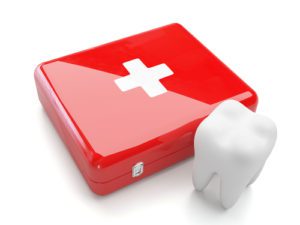 Picture this: It’s the first day of your summer vacation. The fresh ocean breeze and the sound of the waves find you completely relaxed in a hammock beneath a palm tree. Without a care in the world, you take a sip of the ice-cold beverage in your hand and suck in a piece of ice to munch on. You crunch away until suddenly you hear a loud CRUNCH and instantly experience excruciating pain. You are almost certain you’ve broken your tooth. What do you do?
Picture this: It’s the first day of your summer vacation. The fresh ocean breeze and the sound of the waves find you completely relaxed in a hammock beneath a palm tree. Without a care in the world, you take a sip of the ice-cold beverage in your hand and suck in a piece of ice to munch on. You crunch away until suddenly you hear a loud CRUNCH and instantly experience excruciating pain. You are almost certain you’ve broken your tooth. What do you do?
When you have extreme pain, bleeding, a knocked-out tooth, or a tooth that has been displaced but is still in the gums, it is important to contact your dentist right away.
Most dentists keep time slots in their day open specifically for emergency patients. Just call your dentist, explain the situation, and you should be able to be seen. If your accident occurs at night, visit the emergency room.
What Is a Dental Emergency?
A chipped tooth may be an emergency to some people simply for aesthetic reasons, but if it is not causing you pain, there is no need to rush to the dentist. Your dentist will, of course, understand the urgency of getting your tooth fixed and should be able to schedule an appointment with you as soon as possible. When you call your dentist, the receptionist will ask you a series of questions that will help determine if the situation is truly an emergency and how quickly you need care.
Displaced Teeth
If your teeth are knocked in or are suddenly displaced within the gums, they must be put back into place as soon as possible. If the roots are exposed, the delicate cells on the tooth roots will dry out and die after a certain period of time, resulting in tooth death. To avoid this, push the tooth back into place by holding the crown — never the roots. Once the tooth is pushed back into place, gently bite onto a washcloth until you can see the dentist, which should be as soon as possible.
Knocked-Out Teeth
If you completely knock out a tooth, the solution is similar. If the tooth is clean, put the tooth back into place as soon as you can, being careful to handle only the crown. If the tooth is dirty, rinse it in some cold water or milk. Scrubbing or disinfecting the tooth will damage the delicate cells on the root that allow it to reattach.
Extreme Pain
If you experience sudden, extreme pain, it can be a sign that something needs immediate attention. You may have exposed tooth roots or a crack that can become infected and lead to worse problems if it is not taken care of right away. MOTRIN® or ibuprofen can help manage your pain in the moments before your emergency dental appointment.
Bleeding
Bleeding of the gums or teeth may be cause for emergency care, especially if the bleeding is severe. If you have been cut on your gums or inside your mouth and no teeth are harmed, a visit to the emergency room is suitable. If your teeth have been affected, a dentist can help. If you are not sure, call your doctor or dentist and explain your condition. Gums that consistently bleed may be a sign of gingivitis and should be addressed as soon as possible by a dentist.
What if the Damage Has Been Done?
If your tooth dies and it is still in place, it can still function properly, but it will always appear a darker shade than the other teeth. However, you should not keep a dead tooth in your mouth because the lack of circulation can be a breeding ground for bacteria and infection. Dr. Kevin Sands has options for tooth replacement (such as porcelain veneers and dental implants) that will restore your smile and significantly boost your confidence.
For more information or to schedule a consultation for a smile makeover, call 310.273.0111. For your convenience, you may also fill out our online contact form.